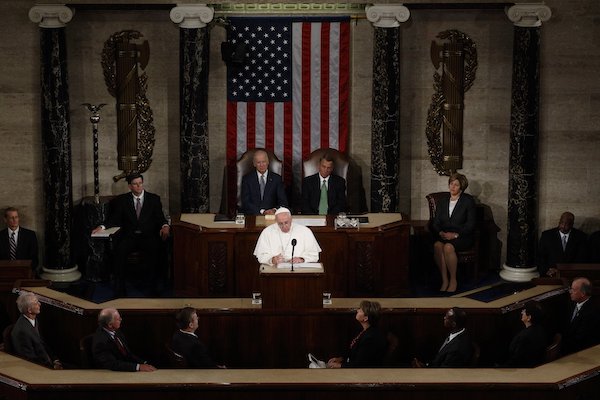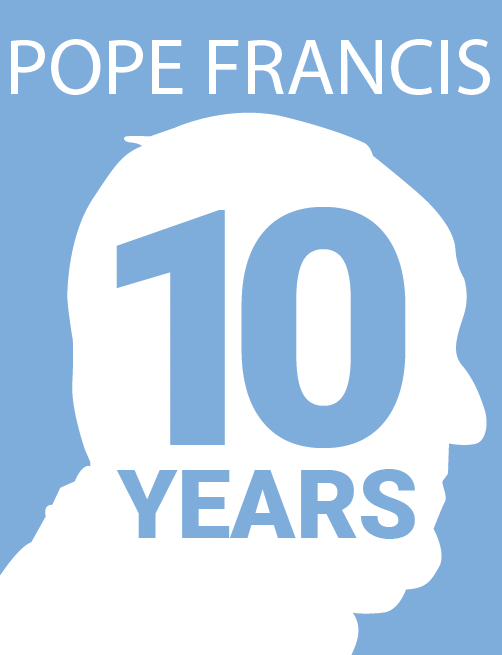
By Kate Scanlon

Pope Francis, formerly Argentine Cardinal Jorge Mario Bergoglio, was elected the Catholic Church’s 266th pope March 13, 2013, after Pope Benedict XVI announced his resignation. During his pontificate, Pope Francis has rejected the notion of the church as a political organization, emphasizing themes such as caring for marginalized people and creation. But these interconnected themes don’t fit neatly into American political ideologies, Catholics in politics or related fields told OSV News.
“I think he’s brought greater attention to the role of Catholics in our federal government,” Chris Kerr, executive director of Ignatian Solidarity Network, told OSV News. “Everyone from President (Joe) Biden to Kellyanne Conway to members of Congress, illuminating that Catholic teaching has application in the public sphere.”
“It may not always be applied in a way that leaders of the church or the average Catholic like, but it creates this kind of public dialogue point,” Kerr added. “I think he’s brought relevance to the church in the public sphere.”
Dan Rober, a professor of Catholic studies at Sacred Heart University in Fairfield, Connecticut, told OSV News that Pope Francis’ life experience with politics prior to his pontificate was largely influenced by Latin American politics, seeing authoritarianism firsthand.
“So he’s coming to American politics with a set of experiences and perspectives that are quite different and that don’t map very well on to our party politics,” Rober said. “And I think a lot of Americans have found that challenging or, in many cases, frustrating, because Francis does not easily align with our politics. And he often seeks very directly to challenge them.”
Rober said Pope Francis sees democracy as an important political value, one that aligns with “the Catholic vision of the common good.”
“Francis’ vision of the common good ought to make everyone uncomfortable and ought to cause people to raise questions,” Rober said, emphasizing that “they’re put in the context of an array of issues that he views as all interconnected.”
One glimpse of how Pope Francis sees political issues as intertwined was in his encyclical “Laudato Si'” on the call to care for “our common home,” outlining how he views “concern for nature” and “justice for the poor” as inherently connected.
In that document, Pope Francis cites St. Francis of Assisi, whose name he chose to guide his pontificate, as “the example par excellence of care for the vulnerable and of an integral ecology lived out joyfully and authentically.”
That document was praised by lawmakers in the U.S. for whom climate issues are key priorities, including former Democratic presidential candidate Sen. Bernie Sanders, I-Vt. But as a part of his critiques of what he dubbed the throwaway culture, Pope Francis described abortion as a part of a culture of waste.
“Since everything is interrelated, concern for the protection of nature is also incompatible with the justification of abortion. How can we genuinely teach the importance of concern for other vulnerable beings, however troublesome or inconvenient they may be, if we fail to protect a human embryo, even when its presence is uncomfortable and creates difficulties?” Pope Francis wrote in the encyclical.
Pope Francis sees abortion as a part of the throwaway culture, Rober said, but also would characterize a lack of social support systems for pregnant women and families in difficult circumstances as a part of that same throwaway culture.
Stephen Schneck, a Catholic activist and retired professor at The Catholic University of America, told OSV News that Pope Francis “has called on the church to be a ‘poor church for the poor.'”
“Emphasizing the Gospels and evangelization over thou-shall-nots, he names the Beatitudes and the Matthew 25 as the ‘twin pillars of Christianity,'” said Schneck, who was appointed in 2022 by President Joe Biden to serve on the U.S. Commission on International Religious Freedom, a watchdog monitoring religious freedom issues. “For Catholics in American public life, this Gospel focus has enriched the way in which we understand the real purpose of politics, governance and policies.”
Kerr praised Pope Francis for bringing “global attention to the reality of people who migrate,” not just at the U.S.-Mexico border, but all over the world.
“He has illuminated the church’s positions on migration, and brought a message of compassion that people in the political sphere have had to think about how to navigate,” Kerr said, noting the pontiff’s advocacy for migrants during both the Obama and Trump administrations.
Schneck noted that “many Catholic and even some non-Catholic political leaders have been inspired by Pope Francis.”
“Sen. Marco Rubio (R-Fla.), Sen. Bob Casey (D-Pa.), former Speakers John Boehner, Paul Ryan and Nancy Pelosi have all cited his words,” Schneck said. “President Joe Biden has spoken admiringly of the Holy Father’s papacy on several occasions.”
Kerr said that “Catholic social teaching is complex,” and Catholics should heed Pope Francis’ call to approach it with “breadth and depth.”
“Our social teaching does not align perfectly with any one political party’s platform,” he said. “Our platform is the Gospel.”
